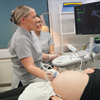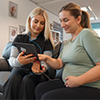Pregnancy is an exciting journey, but it can also come with its fair share of aches and pains—especially in your back. As your baby grows and your body changes, back pain is one of the most common discomforts expectant mums experience. Whether it’s a dull ache or sharp twinges, back pain can be frustrating, but the good news is there are several ways to alleviate it and make your pregnancy more comfortable. Here’s a look at some NHS-backed strategies for relieving pregnancy back pain.
Why Does Pregnancy Cause Back Pain?
Back pain during pregnancy is common and usually results from several factors:
- Weight Gain: As your baby grows, your body gains weight, which puts extra strain on your back muscles.
- Hormonal Changes: The hormone relaxin is released during pregnancy to help loosen ligaments in the pelvis and prepare your body for childbirth. However, this can also lead to less stability in your spine.
- Posture Changes: As your belly grows, your posture shifts to accommodate the extra weight, which can cause added pressure on your lower back.
- Center of Gravity: The growing belly can pull your center of gravity forward, making it harder to maintain a neutral spine position.
With these changes, it’s no wonder your back might start to feel sore and uncomfortable. Here are some NHS-recommended methods to get relief.
1. Practice Good Posture
As your pregnancy progresses, maintaining good posture is more important than ever. Slouching or leaning back too much can worsen back pain. Instead, try to stand tall with your shoulders back, and avoid locking your knees. When sitting, use a chair that offers proper back support or place a small pillow behind your lower back for extra comfort.
2. Use a Pregnancy Support Belt
Pregnancy support belts are designed to help distribute your growing belly’s weight more evenly, providing relief to your back and pelvis. These belts can be worn under your clothes for discreet support throughout the day. Many women find them helpful, especially during the second and third trimesters.
3. Exercise and Stretching
Staying active during pregnancy can actually help reduce back pain. Gentle exercises, such as walking, swimming, or prenatal yoga, can strengthen your core muscles, improve posture, and relieve tension in your back.
Stretching is equally important. Simple stretches like pelvic tilts or cat-cow stretches can help alleviate tightness in the lower back. Always consult with your healthcare provider to ensure these exercises are safe for you.
The NHS has more information on exercising during pregnancy, which includes tips and advice for safe activity levels.
4. Try Prenatal Massage
Prenatal massage is a safe and relaxing way to ease pregnancy-related aches and pains, including back pain. A licensed massage therapist trained in prenatal techniques can work out tension in your back and help increase blood flow to the area. However, be sure to get approval from your healthcare provider before booking a session.
5. Apply Heat or Cold Therapy
Heat and cold can be effective tools for easing back pain during pregnancy:
- Cold packs can help reduce inflammation if you’re experiencing sharp pain or swelling.
- Heat pads or warm baths are great for relaxing muscles and soothing chronic aches. Just make sure the water isn’t too hot—warm, not scalding, is best during pregnancy.
The NHS advises caution with heat, so consult their guidance on backache and heat therapy for more details.
6. Sleep on Your Side
Sleeping on your back can increase pressure on your spine and aggravate back pain. Instead, sleep on your side, preferably your left side, as this can improve blood circulation to your baby and relieve pressure on your lower back. Place a pillow between your knees to keep your hips aligned and reduce strain on your spine.
7. Stay Hydrated and Nourished
Staying hydrated and maintaining a balanced diet with plenty of calcium and magnesium can help support your muscles and prevent cramping, which can contribute to back pain. Drinking enough water throughout the day can also help reduce muscle spasms and tension.
8. Consider Chiropractic Care
Chiropractic care can also help manage pregnancy-related back pain. A chiropractor experienced in treating pregnant women can perform gentle spinal adjustments to align your body and reduce pain. However, always consult your doctor before visiting a chiropractor to make sure it’s safe for you.
9. Wear Comfortable Shoes
High heels or shoes with inadequate support can add unnecessary strain to your back. During pregnancy, opt for comfortable shoes with good arch support. Flat shoes or sandals with cushioned soles are ideal for keeping your posture and back in alignment.
10. Speak to Your Doctor
If your back pain becomes severe or doesn’t improve with at-home remedies, it’s important to consult your doctor. They may recommend physical therapy or other treatments to address the root cause of your pain. In some cases, pain may be a sign of something more serious, so it’s always a good idea to get it checked out.
The NHS provides information on when to see a doctor for back pain.
Final Thoughts
Pregnancy back pain is a common discomfort that many women face, but with the right strategies, you can manage the pain and still enjoy this special time. From practicing good posture and staying active to using heat therapy or a support belt, there are plenty of ways to relieve back pain and keep your body feeling more comfortable. Remember to listen to your body and take it easy when needed—your comfort and well-being are important for both you and your baby.
If you’re struggling with back pain, don’t hesitate to reach out to your healthcare provider for guidance. They can help you find the best solution for your specific needs and ensure that both you and your baby are happy and healthy.













 Packages & Prices
Packages & Prices  Important Info & Policies
Important Info & Policies  Your Scan
Your Scan